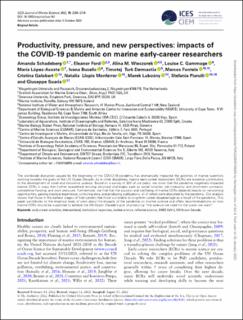| dc.contributor.author | Schadeberg, Amanda | |
| dc.contributor.author | Ford, Eleanor | |
| dc.contributor.author | Wieczorek, Alina M. | |
| dc.contributor.author | Gammage, Louise C. | |
| dc.contributor.author | López-Acosta, María | |
| dc.contributor.author | Buselic, Ivana | |
| dc.contributor.author | Dermastia, Timotej Turk | |
| dc.contributor.author | Fontela, Marcos | |
| dc.contributor.author | Galobart, Cristina | |
| dc.contributor.author | Monferrer, Natalia Llopis | |
| dc.contributor.author | Lubosny, Marek | |
| dc.contributor.author | Piarulli, Stefania | |
| dc.contributor.author | Suaria, Giuseppe | |
| dc.date.accessioned | 2023-01-04T07:25:31Z | |
| dc.date.available | 2023-01-04T07:25:31Z | |
| dc.date.created | 2022-12-14T13:22:18Z | |
| dc.date.issued | 2022 | |
| dc.identifier.citation | ICES Journal of Marine Science. 2022, 79 (8), 2298-2310. | en_US |
| dc.identifier.issn | 1054-3139 | |
| dc.identifier.uri | https://hdl.handle.net/11250/3040806 | |
| dc.description.abstract | The worldwide disruption caused by the beginning of the COVID-19 pandemic has dramatically impacted the activities of marine scientists working towards the goals of the UN Ocean Decade. As in other disciplines, marine early-career researchers (ECRs) are essential contributors to the development of novel and innovative science. Based on a survey of 322 of our peers, we show that the pandemic negatively impacted marine ECRs in ways that further exacerbate existing structural challenges such as social isolation, job insecurity, and short-term contracts, competitive funding, and work pressure. Furthermore, we find that the success and wellbeing of marine ECRs depends heavily on networking opportunities, gaining practical experience, collecting data, and producing publications, all of which were disrupted by the pandemic. Our analysis shows that those in the earliest stages of their careers feel most vulnerable to long-term career disadvantage as a result of the pandemic. This paper contributes to the empirical body of work about the impacts of the pandemic on marine science and offers recommendations on how marine ECRs should be supported to achieve the UN Ocean Decade’s goal of producing “the science we need for the ocean we want”. | en_US |
| dc.language.iso | eng | en_US |
| dc.publisher | Oxford University Press on behalf of International Council for the Exploration of the Sea. | en_US |
| dc.rights | Navngivelse 4.0 Internasjonal | * |
| dc.rights.uri | http://creativecommons.org/licenses/by/4.0/deed.no | * |
| dc.subject | UN Ocean Decade | en_US |
| dc.subject | SARS-CoV-2 | en_US |
| dc.subject | reflexive science | en_US |
| dc.subject | marine science | en_US |
| dc.subject | institutional responses | en_US |
| dc.subject | intersectional | en_US |
| dc.subject | arly career scientists | en_US |
| dc.title | Productivity, pressure, and new perspectives: impacts of the COVID-19 pandemic on marine early-career researchers | en_US |
| dc.title.alternative | Productivity, pressure, and new perspectives: impacts of the COVID-19 pandemic on marine early-career researchers | en_US |
| dc.type | Peer reviewed | en_US |
| dc.type | Journal article | en_US |
| dc.description.version | publishedVersion | en_US |
| dc.rights.holder | Copyright: The Author(s) 2022. Published by Oxford University Press on behalf of International Council for the Exploration of the Sea. | en_US |
| dc.source.pagenumber | 2298-2310 | en_US |
| dc.source.volume | 79 | en_US |
| dc.source.journal | ICES Journal of Marine Science | en_US |
| dc.source.issue | 8 | en_US |
| dc.identifier.doi | 10.1093/icesjms/fsac167 | |
| dc.identifier.cristin | 2093123 | |
| cristin.ispublished | true | |
| cristin.fulltext | original | |
| cristin.qualitycode | 2 | |

